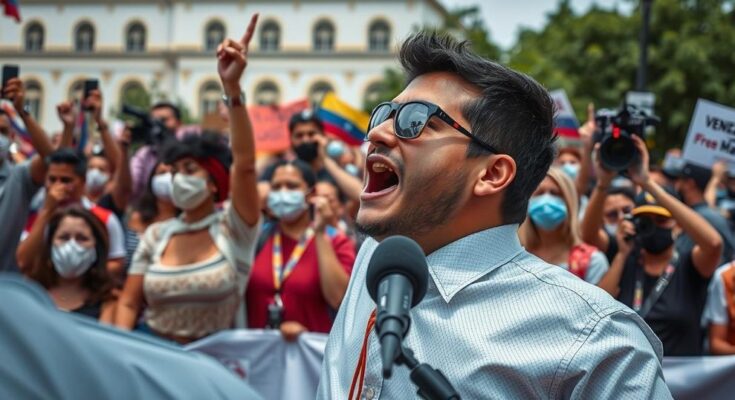Nicolás Maduro has announced the release of over 100 protesters to mitigate pressure after a contested election. This comes amidst a legitimacy crisis, with over 2,000 total arrests reported since the election. Human rights organizations are skeptical about the government’s claims, as they confirm only a fraction of released detainees. The situation remains dire, with ongoing human rights violations drawing international scrutiny.
In a bid to alleviate mounting pressure following a contested election, Venezuelan President Nicolás Maduro has announced the release of over 100 protesters who had been detained. This decision accompanies an earlier release of 225 individuals made last month, as the Chavista regime grapples with a significant legitimacy crisis. As a consequence of the electoral turmoil, Venezuela saw over 2,000 arrests, with a notable number of detainees still unaccounted for, including minors.
As of this week, 103 individuals have been released according to the Vice Presidency of Citizen Security and Peace. However, human rights advocates have verified only 25 of these claims thus far. Among those freed, at least 19 are teenagers who were arrested during anti-government protests on July 29 and 30, opposing the election results where Maduro was declared the victor amidst widespread allegations of electoral fraud. The situation has prompted substantial international condemnation, particularly towards the treatment of minors, which has fueled ongoing demonstrations for their release.
Maduro’s authoritarian response to dissent, including the persecution of political opponents, has intensified scrutiny from international observers. With an impending inauguration, Maduro is under pressure to present a façade of legitimacy, as there are concerns of a potential international rejection of his administration reminiscent of the disavowal faced after the controversial elections of 2018. The Human Rights Watch organization is actively pursuing clarity regarding cases of enforced disappearances and the status of detainees, such as Sofía María Sahagún Ortíz, a dual citizen who has been missing since late October.
Despite the government’s claims of releasing political prisoners, the repression against political dissenters continues unabated, with arbitrary detentions and reports of human rights abuses surfacing daily. Notably, the current situation has escalated calls for accountability within the Venezuelan government, positioning the prospect of legal repercussions for human rights violations within international legal forums. In light of these developments, further updates from the United Nations’ High Commissioner for Human Rights are anticipated as part of ongoing investigations into the Venezuelan regime’s actions.
The context of this article centers around the political landscape in Venezuela, particularly following the presidential elections that were marred by accusations of fraud and irregularities. The aftermath has seen a significant crackdown on dissent, leading to mass arrests of protesters, with many individuals being charged with terrorism-related offenses. The government, facing severe legitimacy challenges, is attempting to mitigate domestic and international criticism by releasing some detainees, albeit amidst much skepticism about their intentions and the extent of these reforms. Moreover, issues surrounding the treatment of minors and allegations of enforced disappearances underscore the dire human rights conditions in Venezuela. The actions of the Maduro administration reflect a broader trend of authoritarian governance and deepening political unrest in the country.
In summary, President Nicolás Maduro’s recent announcement regarding the release of over 100 detained protesters is a response to escalating pressures following a disputed election. While this gesture may seek to project an image of leniency, serious concerns regarding the legitimacy of these releases and ongoing human rights violations persist. As international scrutiny continues to mount, the Venezuelan government faces critical challenges in restoring credibility while combating widespread dissent.
Original Source: english.elpais.com




